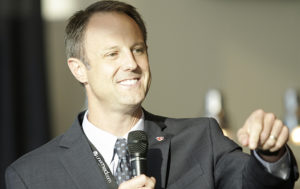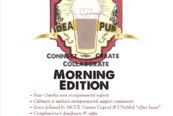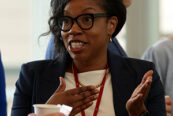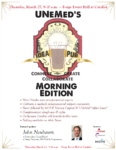
Michael Dixon, PhD
OMAHA, Nebraska (May 10, 2022)—UNeMed President and CEO Michael Dixon, PhD, will be among a nine-person team on a prestigious initiative aimed at developing innovation and entrepreneurship in the area.
“I’m really excited to be a part of this team, and to have the opportunity to help grow our regional entrepreneurial ecosystem,” Dr. Dixon said. “As one of the primary stakeholders of our local innovation economy this program will allow the university to continue to drive our technology and talent.”
Omaha joins the MIT Regional Entrepreneurship Acceleration Program or MIT REAP as a part of its ninth cohort. Over the next two years, the Omaha team will learn and adapt the frameworks developed by MIT to accelerate innovation-driven entrepreneurship in the region.
“As this is one of the top global entrepreneurship programs in the world, the Omaha team will have access to research and tools that will allow us to continue to build on the momentum we already have,” Dr. Dixon said. “The decision to participate in this program was a no brainer for UNeMed. This project will do more than lift Omaha and the immediate area: It gives all of us here at the University of Nebraska more options, more clout, more opportunity to get our inventors and their discoveries out the door.”
MIT REAP is a global initiative that engages with communities around the world to supercharge IDE ecosystems and transform economies. The Global program employs an evidence-based “team” approach, translating MIT research and insights into a practical, actionable, and strategic framework that convenes and educates key stakeholders, and empowers regional leaders to drive meaningful, long-term economic and social change.
Kansas City, Des Moines and St. Louis will be in the same cohort as Omaha; and collaborators from Brazil, Australia, Hungary, Dominican Republic and Hungary will add international flair.
Laurel Oetken, Director of Entrepreneurship and Innovation for the Greater Omaha Chamber, will lead the Omaha team, which includes highly influential regional leaders who represent five major stakeholder groups: government, university, corporate, risk capital, and entrepreneurs.
“The Greater Omaha Chamber has long recognized the importance of startup growth in regional economic development and we are constantly on the lookout to offer more support, awareness and resources for this crucial community,” Oetken said in a press release. “Once we saw the opportunity to showcase the Omaha area’s tremendous talent and ideas through MIT REAP, we jumped at the chance. I am thrilled at the diverse talent our team brings to the table and can’t wait to start making real progress through these next two years and beyond.”
Joining Oetken and Dr. Dixon on the team are:
- Joe Petsick, Executive In Residence, University of Nebraska, College of Business
- Niki Ferguson, Entrepreneurial Development Manager, Advance Southwest Iowa Corporation
- Brian Ardinger, Director of Innovation, Nelnet
- Erica Wassinger, General Partner, Proven Ventures
- Adriana Cisneros Basulto, CEO, Maxwell
- Scott Brag, Vice President, Chapman & Company
- Trevon Brooks, Business Development Manager for the Nebraska Department of Economic Development
Goals for the Omaha cohort are:
- Address research-identified challenges such as ensuring the entrepreneurship talent pipeline, risk aversion throughout the community, a lack of consistent goals and gaps in programming and resources.
- Build mutually beneficial partnerships and relationships with Cohort 9 teams representing the American heartland: Kansas City, Des Moines, and St. Louis.
- Make the Midwest a premiere place for startups to establish, grow, and scale their businesses by leveraging opportunities that Omaha’s unique entrepreneurial ecosystem provides and discover how we can work with other nearby cities, such as Lincoln, Nebraska, and Council Bluffs, Iowa, to further its reach and connect the greater Nebraska ecosystem.
MIT REAP Global teams participate in a two-year program focused on accelerating innovation-driven entrepreneurship (IDE) in their regional innovation ecosystems and are provided opportunities to collaborate with teams within and across their Cohort.
“We’re thrilled to welcome leaders from such a diverse group of regions into Cohort 9,” said Travis Hunter, Director of MIT REAP. “Now in our tenth year, we look forward to sharing the learnings and impact of our global alumni community with our incoming teams and seeing the momentum they will bring to their own regions’ IDE ecosystems.”
Regions from across the globe apply for admission to MIT REAP’s Global program with a particular “urgency for change” or problem area in their region’s overall system that they want to address. The MIT REAP faculty then work with each team to overcome the regional challenges that are hindering the growth of its IDE ecosystem by identifying the region’s comparative advantages and the acceleration mechanisms required to promote IDE.











